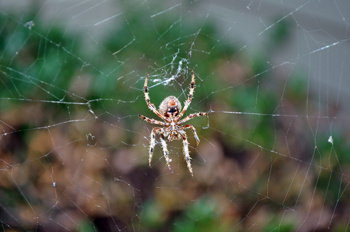Keeping Insects Outside Your Home

Fall is here! Cooler temperatures and fall weather has come knocking at our doors. Many of you are probably thinking about fall landscaping and outdoor decorations. While you are outside, don’t forget about the steps to keep the bugs outside.
Don't invite bugs in
The first item involves removing all the open "windows and doors," so to speak. To an ant, cricket or box elder bug, a quarter-inch crack is like an open invitation to come inside. You wouldn’t think about leaving your doors and windows open for any critter to come wandering in, so why leave those cracks around them open. Make plans for a home improvement and fall preparation weekend and buy a dozen tubes of a good latex or silicone caulk. Spend some time caulking around doors and windows, around the water, gas and utility lines that enter your house, and around the base of where your siding meets your foundation. I’ll bet you use those tubes of caulk up pretty quickly.
Next check the screens on your doors and windows, the weather strips on outside doors, and the weatherstrip on the bottom of your garage door. If there are holes, tears or worn spots, take the time to repair or replace them so that not only the insects but cold weather stays out this winter. The money you spend here will likely be repaid in lower utility bills.
Clean up around the house foundation
As you tried to do some of your caulking, chances are you had a hard time getting between some of your foundation shrubs and the house. Over time, plants get bigger and this is probably a good time to do some pruning. Keeping limbs from trees and bushes off your house will make it more difficult for insects to crossover and find an entrance inside. The extra air movement may also help to eliminate moist areas around the foundation that often attract decomposing insects.
A final point about the space around your foundation is to make sure you don’t have an accumulation of leaves, piled wood or other material against the house. These provide a great hiding place for insects and are an invitation to "Come Inside!" Keep the space clear around your house and you're much less likely to have uninvited insect guests.
Treating house foundation creates an insect barrier
Once you have all the physical spaces closed off, and all the good hiding places removed, you might want to consider treating the foundation and soil immediately around your house with an insecticide. This invisible barrier of insecticide can help to reduce any insect populations that might be living in the soil cracks around your home. It can also help to reduce populations of insects that wander into the area looking for a place to take cover as the weather turns cool this fall. There are a number of general-purpose insecticides that would work for this barrier spray, but might include active ingredients like,
- cypermethrin,
- bifenthrin,
- Lamda-Cyhalothrin, and
- Cyfluthrin.
Always read pesticide labels to make sure you are applying according to directions.